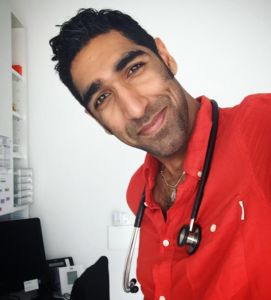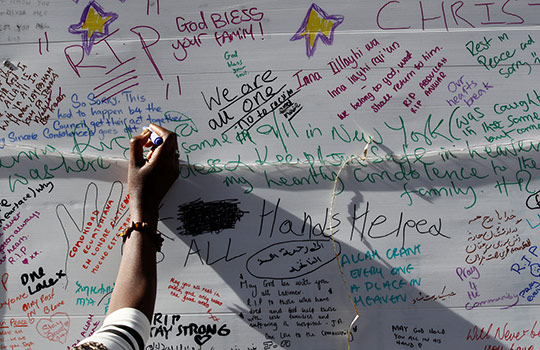Grenfell has brought important lessons to the foreground for us as medics
 I am a GP working close to Grenfell Tower. I was present at the rescue centre on the day of the fire and previously wrote about my moving and positive experiences that day. Through my work as a local doctor I have had the privilege of continuing to offer support and care to some of those affected.
I am a GP working close to Grenfell Tower. I was present at the rescue centre on the day of the fire and previously wrote about my moving and positive experiences that day. Through my work as a local doctor I have had the privilege of continuing to offer support and care to some of those affected.
The past 100 days since Grenfell burnt have been hard and busy for everyone, both the local community and all service providers. I can only speak for the medical service, of which I am one cog in a huge machine. Many health managers and administrators have still not resumed their pre-Grenfell duties. Providing optimal care has not been easy. The magnitude of the event, the socioeconomic deprivation, the political reverberations, the pre-existing physical and mental health burden of the residents, the difficulties in inter-agency information sharing—these are just some examples of the obstacles, which have had to be surmounted to organise the right care for the right people.
Despite these obstacles, it is inspiring to see how rapidly and successfully the NHS responded to the event. Medical provision was present on the ground from day one, with bereavement counsellors and psychologists also visiting from the start. There is a 24 hour help line. GP surgeries are running PTSD screening clinics and referring those who need further assessment. The local mental health team knocked on doors and even went along to Notting Hill Carnival. More importantly, I’ve seen the benefits of all this in patients: some small steps of progress and normalisation, hints of hope that healing and recovery are possible and underway. For an organisation already stretched to near breaking, to achieve this is, I think, worthy of praise.
The event has challenged me as a doctor and a human. The pathology is on a community level. How do you treat an entire community for bereavement? I did not receive that lecture at medical school. Grenfell bleeds into every consultation, whether they come for a repeat prescription, for backache, or for insomnia, Grenfell usually arises in the conversation. After the fire, the love and support for the community gave me a sense of optimism. My optimism then turned for a while to anger and resentment at the lack of culpability and the obstacles to providing care. Now, however, when I think of Grenfell, I feel only sadness. Like my patients, I continue to ask myself, how did this happen? Who is responsible? How many have died? When will we have the answers? I struggle to reconcile how these questions can remain unanswered in a first world country 100 days after an event.
I have learnt first hand what “vicarious trauma” means. Initially, I felt empathy as one human does for another. My family’s home burnt once and the only possessions to survive the blaze were our Qurans. We kept these for years and our Quran cupboard always smelt of fire. After hearing the stories of heartache, loss, bereavement, and anger, it is difficult to remain a spectator to the tragedy. Witnessing the tears and distress, and hearing the legacy of the event in the intimate confines of your consulting room creates a tangibility that permeates you. I have wept with patients as they tell me their joy at finally being released teeth and bones to bury. I find myself often thinking about these moments—when I am on the train, in an uber, in bed at night—and of these people, most of whom I never met and none of whom I will now ever meet.
I think Grenfell has brought a few important lessons to the foreground for us as medics. With acid attacks, terror attacks, and the like now occurring regularly in the UK, do we need to factor that into the way in which we are trained? Does primary care need to incorporate more medicine that treats the community as a single unit? And with a workforce already struggling with suicide and burnout, do events like these make workers more resilient or more vulnerable? I would recommend that we are proactive in addressing these issues.
Ahmed Kazmi is a GP in west London, originally from Warwickshire. He has worked in the UK and Australia and his main special interests are dermatology and mental health. He is also a stand-up comedian. Twitter: @drahmedkazmi
Competing interests: None declared.
See also:
- A GP’s experience of the Grenfell Tower fire
- I am a better doctor for allowing myself to stop, reflect, and grieve
- High rise living after Grenfell
- Grenfell survivors shouldn’t be afraid to go to hospital
- Grenfell Tower fire: why we cannot ignore the political determinants of health
- Margaret McCartney: To the best of humankind, thank you
